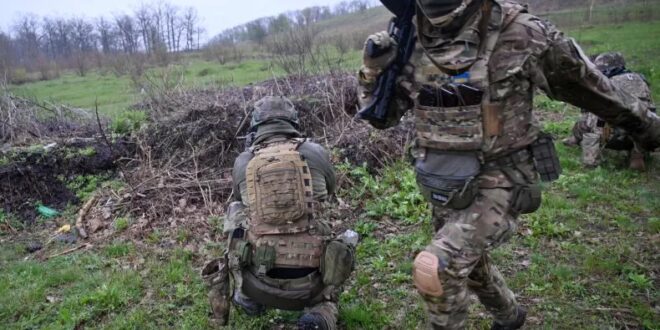The United States and its G7 allies wrapped up their foreign ministers’ meeting in Karuizawa, Japan this week on a note of strength and unity. Japanese Foreign Minister Yoshimasa Hayashi, who facilitated the gathering, couldn’t help but brag about its success during the closing press conference, stressing that “the strength of the solidarity between the G7 foreign ministers is at a level not seen before.”
The joint communiqué issued by the group covered many topics of concern, from the Mideast peace process and Taiwan, to climate change and economic security. At the very top of the list was the war in Ukraine, and it was the very first topic the G7 addressed in its communiqué. Strongly condemning Russia for violating Ukraine’s sovereignty and territorial integrity, the G7 went on to reconfirm its support for Ukraine “for as long as it takes and to providing sustained security, economic, and institutional support to help Ukraine defend itself, secure its free and democratic future, and deter future Russian aggression.”
That phrase, “for as long as it takes,” wasn’t accidental or plucked out of thin air. The Biden administration invoked this same expression on countless occasions since the war began nearly 14 months ago, partly to disabuse Russia of the notion that a longer war would serve its interests. In addition to helping the Ukrainian army retake as much of its territory as possible, one of the primary U.S. objectives is to make President Vladimir Putin’s war a “strategic failure” for Russia, as President Joe Biden said last summer. The U.S. is not only looking for a Ukrainian win, but a result that will atrophy Russian military power to the point where other would-be aggressors determine that wars of conquest aren’t worth pursuing.
Much of the rest of the world doesn’t view the war in Ukraine as a high stakes game between good and evil. The U.S. and most of Europe prefer an unambiguous Russian defeat and are doing their best to expedite the heavy, land-based military systems that will make or break Kyiv’s looming counteroffensive against dug-in Russian positions in the east. But countries outside the Western orbit are far less interested in Russia walking away from the war in disgrace than they are in stopping the war itself. This isn’t a new phenomenon; countries like India, South Africa, and Indonesia expressed their preferences on a negotiated solution very early on. Yet as Ukrainian troops prepare themselves for their own assault after months of playing defense, the temptation to cease the fighting is getting stronger.
Brazilian President Luiz Inácio Lula da Silva is one of those leaders who has sought to maintain a neutral position on the conflict. He has refused Washington and Kyiv’s requests to send Ukraine armored vehicles, aircraft, air-defense systems and mortar shells, actions that would upend Brazil’s traditional foreign policy of staying far away from conflicts in other regions. But Lula also understands that Brazil’s potential credibility as an impartial mediator would be ruined if those weapons requests were granted. This is as much a matter of principle for Lula as it is a point of personal pride—he wants to be the statesman who can bring Russia and Ukraine to the negotiating table. Lula’s proposal involves finding several countries that have nothing to do with the war and forming a pro-peace collective. It’s in some ways similar to a diplomatic proposal unveiled by Mexico during last year’s U.N. General Assembly, in which a multi-country High-Level Caucus for Dialogue and Peace in Ukraine would support the U.N. Secretary General’s mediation efforts. The Ukrainian government vocally condemned Mexico’s idea and is likely to do the same with Lula’s.
Iraq, too, offered its diplomatic assistance. During Ukrainian Foreign Minister Dmytro Kuleba’s trip to Baghdad this week, his Iraqi counterpart, Fuad Hussein, said his country “is ready to be in service of peace.” Indian Prime Minister Narendra Modi has made similar comments in the past, and African heads of state ritualistically cite the urgency of negotiations to anyone who will listen. China also publicized its own list of peace principles in February, centering on a ceasefire in service of a diplomatic agreement to end the war.
Ukraine and its partners in the West have largely dismissed these offers as unnecessary and even counterproductive. The reaction was especially stern in the case of China’s initiative, which to be fair wasn’t a serious peace plan. But if Ukraine’s counteroffensive stalls or turns out to be less than meets the eye (as U.S. intelligence leaks speculate), the U.S. won’t be able to reject diplomatic entreaties as quickly and casually as it is today. Impatience with the war in the non-Western world is already high, and there is no doubt constituencies within the U.N. would like to focus on other pressing humanitarian problems that have been sidelined as a result of the Ukraine conflict. The bulk of the world’s countries want to move on, even if that means Russia keeping some Ukrainian land in exchange for guns falling silent.
It’s an idea the Ukrainians, in the midst of an existential conflict characterized by numerous war crimes at Russia’s hand, finds utterly disgraceful. Ukrainian President Volodymyr Zelensky’s position has grown more hawkish as the war goes on, and nowhere does the word “compromise” appear.
Yet the underlying sentiment of a land-for-peace formula is there, and Kyiv will have to get used to hearing more about it if its counteroffensive runs aground (which is still an open question).
 Eurasia Press & News
Eurasia Press & News



